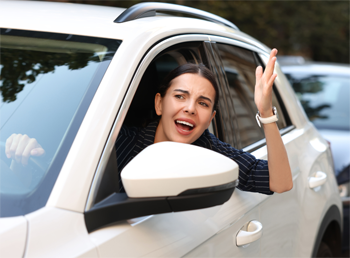AAA: road rage a real problem
VW independent staff/submitted information
If it feels like everyone has road rage these days, that’s because they probably do. A staggering 96 percent of drivers admit to engaging in aggressive driving behaviors over the past year, according to a new study from the AAA Foundation for Traffic Safety. The study also found that more than one in 10 drivers admitted to engaging in violent actions in road rage incidents including striking another vehicle. From speeding and tailgating to cutting off other vehicles, aggressive driving has become a near universal experience – and it’s not just frustrating, it appears to be contagious.
The study found that the more drivers are exposed to aggressive behavior on the road, the more likely they are to drive aggressively themselves. This self-fulfilling cycle of aggressive driving and road rage is fueling a culture where impatience and hostility are becoming the norm behind the wheel.

“Driving can be a stressful experience due to behaviors of others on the road and how you respond to various situations. Our study finds that experiencing various forms of aggressive driving behaviors is common for almost all motorists and many drive aggressively,” said Dr. David Yang, president and executive director of the AAA Foundation for Traffic Safety. “This work also concludes that road etiquette and manners can be a protective factor against aggressive driving. Let’s change our driving culture so we can achieve the safe mobility vision for all road users.”
Other key findings:
- 92 percent of drivers reported aggressive behaviors that put others at risk, like speeding or cutting off other vehicles. Their top motivators were to get to their destination faster and avoid perceived danger.
- 11 percent admitted to violent actions such as intentionally bumping another car or confronting another driver.
- Aggressive driving is contagious: Drivers who experienced higher levels of aggressive driving also had higher levels of engagement in aggressive driving.
- The vehicle plays a role: The kind of car you drive could predict how you act – and how others perceive you. Drivers in sports cars, big trucks, and motorcycles are often seen as more aggressive. Some drivers say they felt more powerful and dominant behind the wheel of these vehicles.
This latest study updates research originally conducted by the AAA Foundation for Traffic Safety in 2016, offering a look at how aggressive driving behaviors have shifted over time. While some behaviors have become more common, others have declined:
Since 2016:
- Cutting off other vehicles is up 67 percent.
- Honking out of anger is up 47 percent.
- On the positive side, tailgating is down 24 percent and yelling at other drivers is down 17 percent.
The study found that encouraging good road etiquette may be the most effective way to reduce aggressive driving and road rage. Simple actions like using turn signals, letting others merge, and offering a friendly wave can help de-escalate tension and create a safer, more respectful driving environment for everyone.
“Having good manners behind the wheel isn’t just about being polite,” said Dr. Jose Torres, AAA traffic safety advocacy and research manager. “It’s about ensuring the safety and well-being of everyone on the road.”
AAA’s top tips if you encounter an aggressive driver
- Stay calm
- No eye contact, no gestures, no response
- Let them pass and keep your distance
- Call 911 or go to a public place — never drive home.
“Not engaging with the other driver during a road rage incident is key to keeping yourself and others on the road safe,” says Kara Hitchens, manager of Public and Government Affairs for AAA. “You never know how far someone is willing to go during one of these incidents and not engaging and staying away from them is your safest bet for avoiding trouble.”
AAA’s top 3 tips to control road rage:
- Breathe before you react — one deep breath can reset your drive.Recognize Outside Stressors
- Be aware of when you’re stressed out and more likely to get frustrated behind the wheel. Do things to help you calm down before you get on the road.
- Leave early, give space, arrive safe.
POSTED: 09/26/25 at 11:14 pm. FILED UNDER: News







